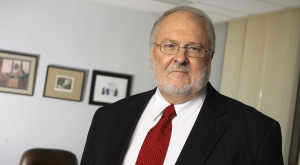Court of Appeal’s Judge takes issue with the General Assembly in its failure to act on the Maryland Contributory Negligence Standard, saying “glaciers move at a better pace.” Evidently Judge Harrell is unable to accept the fact that the legislature’s inability to adopt his position is really support for the doctrine which has been law in Maryland since its founding and has been a frequent topic before the legislature. Rather than trying to overturn Maryland law from the bench, maybe Judge Harrell should run for office in the General Assembly.
_________________________________________________
 Hopes Dashed, Harrell Again Decries Fault Standard
Hopes Dashed, Harrell Again Decries Fault Standard
Judge Pens dissent from denial of cert in challenge to Maryland contributory negligence standard
By: Steve Lash, Daily Record
Over the rare and scathing dissent of one member, Maryland’s top court this month refused to hear another challenge to its long-held legal doctrine barring plaintiffs from recovering damages if they were at all to blame for their injuries.
Judge Glenn T. Harrell Jr. assailed the Court of Appeals’ “poor judgment” and lack of “will and vision” in declining to hear an appeal that urged the high court to replace the contributory negligence doctrine with a comparative-fault standard. That standard would permit plaintiffs to recover damages even if they were partially to blame for their injuries.
Dissents from the denial of certiorari are uncommon, and the text of Harrell’s dissent was not posted on the court’s website. However, a copy of the document obtained by The Daily Record illustrates the judge’s strong desire to “consign [contributory negligence] to the tar pit of history.”
Harrell’s remarks come 14 months after he dissented from the court’s decision in Coleman v. Soccer Association of Columbia, which affirmatively upheld the doctrine the court announced in 1847. All but a handful of other jurisdictions have replaced it with some form of comparative fault.
“How much longer will the Court be content to stand on the sidelines observing the benign neglect or inertia of the General Assembly in failing to grapple meaningfully with this dilemma, or, at best, the stalemate for change when the gladiators for the plaintiffs and defense bars fight again to a draw in the legislative arena?” Harrell wrote. “Glaciers move at a better pace.”
Harrell, in his Coleman dissent, had expressed hope that “a future majority of this Court” would revisit the decision with an eye toward overturning contributory negligence.
But Harrell said his hope has been dashed. “It is now abundantly clear that a majority of the present Court … lacks the will and vision to unseat the Court’s concededly less fair doctrine of contributory negligence, in favor of a system of comparative fault,” Harrell wrote. “To my chagrin, the ‘future majority’ I foresaw in my dissent in Coleman … has not arrived on the scene yet.”
Maryland is one of five jurisdictions that absolve defendants of liability if a plaintiff was at all negligent. The other four are Virginia, North Carolina, Alabama and Washington, D.C.
The Sept. 3 denial of James Sampson’s petition does not end his fight for compensation for broken bones and other injuries sustained when he was struck by a car while crossing Pratt Street at its intersection with Sharp Street in Baltimore, his attorney, James K. MacAlister, said Wednesday.
The appeal will now be heard by the Court of Special Appeals, which had held the case in abeyance pending Sampson’s petition to the high court.
Last October, a Baltimore City jury found motorist Victoria Basso at fault in the incident, which occurred at 7 a.m. on April 9, 2010. The jury, however, also concluded that Sampson, who is legally blind, was contributorily negligent by walking outside the crosswalk.
While he now expects the Court of Special Appeals to reject his challenge to the doctrine of contributory negligence, MacAlister said he hopes it will accept one of his alternate arguments.
Basso’s attorney, James S. Francomano, did not return telephone messages seeking comment Wednesday. He is with H. Barritt Peterson Jr. & Associates in Towson.
Quoting Otter
If Sampson loses before the Court of Special Appeals, MacAlister said he will again petition the high court to overturn contributory negligence.
“I’m an optimist but not delusional,” said MacAlister, of Saiontz & Kirk P.A. in Baltimore. “[But] it makes no sense not to take another shot.”
Harrell, in his dissent, made a similar point, citing a line from the character Eric “Otter” Stratton in the 1978 movie, Animal House: “I think this situation absolutely requires a really futile … gesture be done on somebody’s part,” Otter said.
“Although my dissent in Coleman and again here may appear to be the sort of ‘really futile gesture’ contemplated by Otter, I feel compelled to bear witness to the Court’s poor judgment in continuing inferentially to hide behind stare decisis or the skirts of the General Assembly,” Harrell wrote.
The case is Sampson v. Basso, No. 244, Sept. Term 2014.
